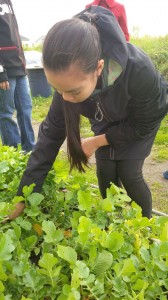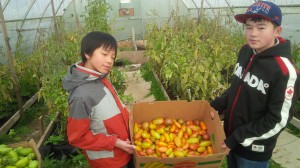Patricia Kuhl shares astonishing findings about how babies learn one language over another — by listening to the humans around them and “taking statistics” on the sounds they need to know. Clever lab experiments (and brain scans) show how 6-month-old babies use sophisticated reasoning to understand their world. (Filmed at TEDxRainier in 2010.)
From Zero to Hero
Bill Gates, Sergey Brin and Larry Page have proven that indeed, life allows for the “revenge of the nerds”. Now there’s social science research that supports this! Researchers at the University of Virginia followed 184 students over a ten year period and found that 13-year-olds who engaged in ‘pseudomature behaviors’ in search of “coolness” and popularity were more likely to have problems with drugs and alcohol by their early 20s. For a succinct summary, please read this article from Medical Daily on the findings published in June’s Child Development Journal.
The BGUTI Principle – Not!
This should come as no surprise to those who know us, but we don’t follow the BGUTI (Better Get Used To It) principle when it comes to preparing our students for life. The BGUTI principle is the view that education is preparation for the drudgery of living in a world where one seemingly has little control and less options. We prefer to nurture the view of education as preparation for the miracle of living where choices are abundant and the individual thrives while contributing to the ongoing shaping of a dynamic community.
Some parents worry that children attending our schools are “sheltered”, that our vision is “unrealistic”, and that inevitably, our students will have to learn that “life isn’t like Montessori” (although the founders of Google and Amazon would not agree!). On the other hand, we receive frequent feedback about the difficulties parents and students have at other schools, where the BGUTI principle dominates – with resulting emotional, educational and socialization difficulties. Alfie Kohn, author of numerous books on parenting and education, sums it up in his article, Getting Hit on the Head Lessons: Justifying Bad Educational Practices as Preparation for More of the Same:

LGMS students on “Fiery Furnace” Hike at Arches National Park, 2014
…people don’t really get better at coping with unhappiness because they were deliberately made unhappy when they were young. In fact, it is experience with success and unconditional acceptance that helps one to deal constructively with later deprivation. Imposing competition or standardized tests or homework on children just because other people will do the same to them when they’re older is about as sensible as saying that, because there are lots of carcinogens in the environment, we should feed kids as many cancer-causing agents as possible while they’re small to get them ready.
Leading by example, we prefer our community to be brave enough, prepared enough and confident enough to uplift each other, our families, our larger community and eventually the world. Our community began with only two pre-school students in February of 1999. Each year, it has developed and grown to further embody Maria Montessori’s aspirations.
Joyfully looking back on this and previous years with appreciation while Reaching Beyond into next,
Riza Weinstein
“It’s not our job to toughen our children up to face a cruel and heartless world. It’s our job to raise children who will make the world a little less cruel and heartless.” ― L.R. Knost, Author of Two Thousand Kisses a Day: Gentle Parenting Through the Ages and Stages
© Lions Gate Montessori
Cultivating Character
 Now that spring has sprung, our adolescent students are resuming their visits to the farm property on Wednesdays. On our first visit this past April 2nd, we had many important tasks to follow up on, as well as new ones to begin! Firstly, we checked on our year-old beehives. Ms. Candice from Mole Hill explained to us what to expect from the bees this spring: they will be leaving the hive more often to explore the surrounding areas, and they will continue building their home.
Now that spring has sprung, our adolescent students are resuming their visits to the farm property on Wednesdays. On our first visit this past April 2nd, we had many important tasks to follow up on, as well as new ones to begin! Firstly, we checked on our year-old beehives. Ms. Candice from Mole Hill explained to us what to expect from the bees this spring: they will be leaving the hive more often to explore the surrounding areas, and they will continue building their home.
Next up was moving the worm compost, as it is growing by the day! Mr. Lyle explained why the new compost bin is set at an angle: the nutrient rich water run off is collected for later use as a fertilizer and pesticide! We also had the pleasure of propagating raspberry bushes by cutting stems from the healthy plants and planting them in an adjacent row. Our students were able to put their muscles to use when they cut into the dirt with a hoe, creating a small trench for the cuttings. Lastly, we picked arugula, carrots, chard, kale and used them to make a delicious salad back at the school! Finally, the students looked at the effect of the fall pruning on the trees. They saw and smelled the first plum flowers foretelling of sweet fruit to come. This is what the farm school program is all about – learning to use the gifts of the land in a way that can benefit the whole community.
Our second visit to the farm required more digging, lifting, and planting! Ms. Sara kindly led the students in uprooting the grass directly surrounding the base of the fruit trees in order to make way for the compost that would support the permaculture. What is permaculture? It is a community of multipurpose plants, which complement and benefit one another, and which make less work for people!
After the compost had been laid at the base of the fruit trees, four carefully chosen seedling species were planted. Students listened and learned about the benefits of planting calendula, chives, clovers, and nasturtium around the apple trees. This rich understory of plants in the orchard will attract beneficial insects, suppress grasses that compete for water and nutrients with the fruit trees, protect from pests, fix nitrogen, provide good ground cover that allows for the conservation of water, and attract bees, among other things.
One thing is for sure: by the time our morning tasks were complete, our students were ready  for lunch! And what a delicious treat they were offered by the monks at Thrangu Monastery. We are very grateful to them for extending their kindness and generosity in offering us a wonderful vegetarian meal.
for lunch! And what a delicious treat they were offered by the monks at Thrangu Monastery. We are very grateful to them for extending their kindness and generosity in offering us a wonderful vegetarian meal.
The students looked on the changes that resulted from their work last year with pride, and moved immediately into taking on the spring tasks. Their joy, discipline and cheerful work together was a clear display of the truth that cultivating the earth, cultivates character. We look forward to our future visits to the farm and bringing back a bounty of fresh fruits and vegetables to share with our community!
© Lions Gate Montessori
